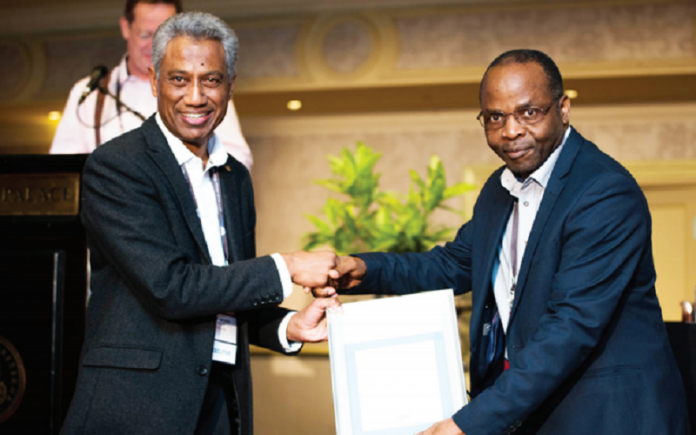

EXPERTISE: Prof Tholene Sodi (right) receiving an PsySSA Award for Mentoring and Development from Prof Anthony Pillay, former president of PsySSA last year. This prize is awarded in recognition of mentoring and developing the careers and studies of students, psychologists or colleagues. Picture : PsySSA
IN A violent country like South Africa, the dire shortage of psychologists in the public sector is not helping.
This is according to Prof Tholene Sodi who says that on top of being violent, South Africans are highly stressed and so there is a need for the qualified expertise that psychology can provide.
Sodi is the Psychological Society of South Africa (PsySSA) president-elect and chair of psychology at the University of Limpopo and told The New Age that most practitioners had turned to private practice.
Although most psychologists employed by the apartheid government were white, Sodi said that from June 2017 there were just under 13000 psychology professionals registered with the Health Professions Council of SA (HPCSA).
“From some 7% representation 25 years ago, blacks comprise more than 41% in clinical psychology, while those in community service account for more than 57%,” she said.
“According to the HPCSA, there were 27 newly-registered clinical psychologists in 1995, whereas in 2013 there were 159 and during 2001-2014, an average of 130 new clinical psychologists were registered per year,” Sodi said.
The professor also said that there had been an increase in psychologists employed in public health facilities and some rural areas post-apartheid. However, there was a significant shortage of posts, making it difficult to place practitioners.
“According to Health Systems Trust, the number of clinical psychologists in the public sector is 2.75 per 100000 population and strategies are being implemented to increase clinical psychology services in the country’s public rural primary healthcare sector. In 2004 the first batch of mid-level registered counsellors began practising,” he said.
Sodi says the World Health Organisation’s Mental Health Atlas which bases its statistics on income levels of countries, shows that lower-middle income countries have 0.2 psychologists per 100000 population.
He says South Africa being an upper-middle income country which sits at 1.4 per 100000 is faring well with high- income countries with 2.7 psychologists per 100000 people.
Sodi says that it would serve as a great reminder to South Africans that this discipline was the first discipline to become fully non-racial and non-sexist.
“From 1994 onwards PsySSA has actively sought to transform and redress the silences in SA psychology to serve the needs and interests of all our people.
“As per its constitution, PsySSA has been actively striving for social justice, opposing policies that deny individuals or groups access to the material and psychological conditions necessary for optimal human development and protesting against any violations of basic human rights,” he said
This month the Pan-African Psychology Union (Papu) and the Psychological Society of South Africa will have a psychology congress, the first of its kind, at the international Convention Centre in Durban, South Africa.
“This convening of psychology leaders marks a turning point for the African continent, as a critical hub of psychological thinking and practice. African psychologists have played, and continue to play, a key role in charting more humane futures – both in Africa and across the world”, Prof Saths Cooper, president of Papu said.
The congress will have a programme that includes scholarly and practice-oriented presentations, with 60 keynote speakers and 50 symposia by leading African and international scholars, pre-congress workshops and several hundred paper presentations.
The key points to be unpacked include African psychologies, human rights, public health, gender and sexuality, and violence.
Papu executive members representing associations from Ghana, Botswana, Cameroon, Zimbabwe, Nigeria, South Africa and Ethiopia will attend the inaugural event.
Other guests that will attend will be leaders of the American Psychological Association, the International Union of Psychological Science, the International Association of Applied Psychology and the International Test Commission as well as Chinese and Russians among others.
The congress will run from September 18 to 21. Prof Anthony Pillay, chair of the Congress Scientific Committee said that the gathering is important given the colonial history of Africa.
“It is for this reason that the decolonisation of psychology and knowledge production feature prominently in the congress programme and offer exciting opportunities for critical discussion, interrogation and debate,” Pillay said.
Hloni Mashigo
news@thenewage.co.za
